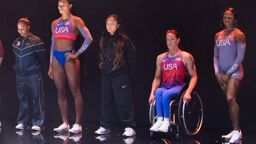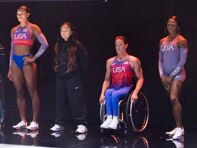The dust has cleared on the most-discussed NCAA Women’s Swimming Championships in history, and Lia Thomas has completed a full season competing for the Penn women’s swim team. With her college career now at an end, we have the benefit of some perspective, even if questions linger.
One of the fascinating dynamics I observed this season with Thomas — and it was front-and-center during the championships — is how voices on different sides regarding trans inclusion in women’s sports have reacted to her success.
Since the championships, advocates for broader inclusion of trans athletes in women’s sports have used Thomas’ shortcomings in the pool to prove their points. At the same time her detractors used her successes to demonstrate theirs. It was that way all season.
Of course, no single athlete’s performance tells a full story — not even close.
When she won, it was trumpeted as showing trans women have advantages (unfair or otherwise) and take away opportunities from cisgender women. When she lost, it showed they don’t.
Of course, no single athlete’s performance tells a full story — not even close. But that hasn’t stopped people on different sides from touting her results for their own purposes.
I feel bad for trans women who may see someone like them succeed and feel the need to cringe about the potential backlash — It’s real, and something I’ve heard from trans people, having covered trans athletes for many years.
Last November, even before Thomas burst on the national stage, I chatted with our contributor Karleigh Webb — herself a trans athlete and a sports journalist — about watching every conversation regarding Thomas, observing advocates stake out their positions, seeing even then what would come.
It all culminated at the NCAA Championships. We saw the way some trans detractors trumpeted Thomas winning the 500-free women’s national title — validation in their minds that she didn’t belong there for the fairness of sex-based sports.
Then I could sense almost relief amongst some trans advocates when she didn’t win the 200-free or 100-free, evidence that cis women can and do beat trans women.
To be sure, these are broad strokes. Webb is a huge supporter of Thomas, and she was elated with Thomas’ title and three All-American designations. A guest on NewsNation, she was grilled and wouldn’t back down from her celebration of Thomas’ accomplishments.
Many trans people celebrated Thomas’ national title with virtual confetti and balloons, no doubt.
Still, the way other advocates on both sides of the discussion have spun Thomas’ performances throughout the season has created scuttlebutt about whether Thomas intentionally slowed in the last two finals of her college career. I’ve had no less than a half-dozen people wonder this very thing to me, and I’ve seen it mentioned in media reports.
Think about that: The tenor of the conversation has gotten so scalding-hot that some people are wondering if an athlete would intentionally lose on the national stage.
Having previously written about truths and myths in the conversation, I wanted to dig into this.
Officially, Thomas finished in fifth place in the 200-free, then finished last in the 100-free final, at the NCAA Championships.
Complicating the issue are some numbers: Her 200-yard-free final time at the NCAAs was 1.31 seconds slower than her prelim time hours earlier, and her 100-free final time was 0.81 seconds slower than prelims.
Some swimmers routinely swim slower at night than in the morning.
That’s not Thomas. At both the Zippy Invitational and Ivy League Championships during the season, her 200-free final times were 1.79 seconds and 2.68 seconds faster in the final.
In fact, the 100-free and 200-free at the National Championships are the only finals all season — including the 500-free at the NCAAs hours earlier — we could identify in which she had a slower time than her prelim.
In each of these two finals at the NCAAs, Thomas slowed down by a larger margin than any other finals swimmer. Thomas’ 100-free-final time was slower than everyone in even the consolation final.
Did Thomas get injured? Hard to believe, as she swam a season-best in the 100-free prelims hours between her two slower finals appearances.
Former Arizona State swimmer Kyle Sockwell has been lauded to me as a respected, fair voice in swimming by people on different sides of this issue. He has routinely sought facts and aimed to dispel myths about Thomas. He said Thomas’ 100-free final was particularly odd, given the length of her turns that certainly slowed her down.
In addition, Outsports spoke with two swimming coaches who called the slower results in her 100- and 200-free finals races — after a consistent record all season of faster finals times — “rare” and “unusual.”
Some who want trans athletes out of women’s swimming will say Thomas did this intentionally to record losses as evidence that trans women don’t “dominate” women’s sports.
Whatever the rules were or are, Thomas complied with them. No one on any side that I’ve seen is claiming she broke any rule.
Trans advocates will say she was just beaten by better swimmers and got tired — And the protestors who were allegedly yelling things at her during the meet didn’t help.
What’s the truth? Frankly, people will believe what they want, as there’s no way to truly know what happened, or that she could have turned on the gas and won three national titles. None of this tells us she was the fastest swimmer in the pool in the 100- or 200-free. She is officially a one-time national champion and three-time All-American.
While Thomas told ESPN moments after her national championship in the 500-free that she tries to tune out the criticism, here we are considering the fact that an athlete might have felt the need to intentionally lose A NATIONAL CHAMPIONSHIP.
And that’s where, to me, the conversation has been at its worst. The criticism over the last few months has been aimed too much at Thomas, instead of at the NCAA, USA Swimming and FINA, whose jobs it is to create good, fair policy and message them well to the public. The NCAA in particular completely bungled the whole episode from both messaging and policy perspectives.
Whatever the rules were or are, Thomas complied with them. No one on any side that I’ve seen is claiming she broke any rule.
And if for some reason she felt the need to — at the height of her college career — swim slower at a national championship, that would be extremely unfortunate for everyone involved. No athlete should be made to feel that way.
Here’s hoping rules and policies emerge that can garner consensus agreement in each respective sport. We will never get everyone to agree, but if we can build consensus in a sport, we have a building block for the future. Right now, we don’t have that.
With trans athletes like cyclist Emily Bridges on the horizon, this debate is only going to heat up with more athletes caught in the middle of it.







































